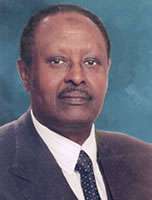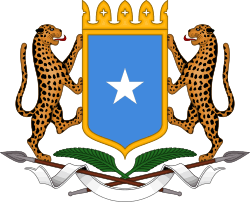Muhammad Haji Ibrahim Egal
Mohamed Haji Ibrahim Egal (Somali: Maxamed Xaaji Ibraahim Cigaal, Arabic: محمد الحاج ابراهيم ايغال) (August 15, 1928 – May 3, 2002) was a veteran Somali politician. He was the first prime minister of the Somali Republic during the early and late 1960s. He also served as the President of the Republic of Somaliland. [3]
Mohamed Haji Ibrahim Egal محمد الحاج ابراهيم عقال | |
|---|---|
 | |
| 2nd President of Somaliland | |
| In office May 16, 1993 – May 3, 2002 | |
| Vice President | Abdirahman Ahmed Ali Tuur (1993-1995)[1] Abdirahman Aw Ali Farrah (1995–1997)[2] Dahir Riyale Kahin (1997–2002) |
| Preceded by | Abdirahman Ahmed Ali Tuur |
| Succeeded by | Dahir Riyale Kahin |
| Prime Minister of the State of Somaliland | |
| In office June 26, 1960 – July 1, 1960 | |
| Preceded by | Sir Douglas Hall (as Governor of British Somaliland) |
| Succeeded by | None (position abolished) |
| 1st and 4th Prime Minister of the Somali Republic | |
| In office July 1, 1960 – July 12, 1960 | |
| Succeeded by | Abdirashid Ali Shermarke |
| In office July 15, 1967 – October 21, 1969 | |
| Preceded by | Abdirizak Haji Hussein Abdullahi Issa |
| Succeeded by | Muhammad Ali Samatar |
| Personal details | |
| Born | August 15, 1928 Odweyne, British Somaliland |
| Died | May 3, 2002 (aged 73) Pretoria, South Africa |
| Political party | United Peoples' Democratic Party Somali Youth League |
| Spouse(s) | (1) Edna Adan (2) Asha Saeed Aabi (3) Hawa Ainab (4) Kaltum Haji Dahir |
Life and education
Egal was born in 1928, in Odweyne then a part of British Somaliland. He hails from the Rer Balle subdivision of the Issa Musse clans, party of Isaaq. He completed his primary, intermediate, and secondary education in former British Somaliland and then went to UK . Egal was married to Asha Saeed Abby, together they had three sons and two daughters.
Career
On 26 June 1960 Egal was Prime minister of the newly independent State of Somaliland, which merged five days later with the former Trust Territory of Somalia to form the Somali Republic on July 1, 1960.
Government work
He served as the first Somali's defence minister (1960–1962), Education Minister (1962–1963), Prime minister (1967–1969), and ambassador to India (1976–1978), although he was imprisoned twice under Barre dictatorship.
Prime minister of Somalia
In 1967, Abdirashid Ali Shermarke was elected President and he appointed Egal as the Prime Minister.[4]
He was still the Prime Minister and in Washington D.C. when President Abdirashid Ali Shermarke was assassinated on October 15, 1969. Shortly afterward, the newly established Supreme Revolutionary Council (SRC) led by Major General Siad Barre, Brigadier General Mohamed Ainashe Gule, Lieutenant Colonel Salaad Gabeyre Kediye and Chief of Police Jama Korshel seized power.[5] The SRC subsequently renamed the country the Somali Democratic Republic,[6][7] arrested members of the former civilian government, banned political parties,[8] dissolved the parliament and the Supreme Court, and suspended the constitution.[9] Egal was among the politicians detained by the SRC for his prominent role in the nation's early government. He was eventually released and was named the Ambassador to India (1976-1978) before the Barre regime imprisoned him again on charges of conspiracy until 1985.
President of Somaliland
Egal managed to successfully disarm and rehabilitate rebel groups, stabilised the north western region and economy of Somaliland, successfully managed to establish bilateral trade with foreign countries, introduce Somaliland new currency the Somaliland shilling, as well as the Somaliland passport and Somaliland national flag and creating the most successful and powerful armed police and military force in Somalia.
Throughout his term as president of the Republic of Somaliland, Egal's dedication to the secessionist cause was doubted and challenged by hardliners, particularly within the Somali National Movement (SNM), who believed that he still ultimately hoped to reconcile with other political actors in the rest of Somalia. In August 2001, Egal survived by one vote a motion tabled by several regional MPs charging him of half-heartedly pursuing separatism.[10] In an interview with IRIN the same year, SNM leader Abdirahman Awale also said of Egal that "when he says he is for independence, it is for local consumption only. He tells the people here one thing, but in his speeches elsewhere he has clearly declared that Somalia will unite one day. He says we will talk to the southerners when they make their home clean and negotiate with them... He says one thing to the public, and a different thing to the international community."[11]
Death
Egal died on May 3, 2002 in Pretoria, South Africa while undergoing surgery at a military hospital. His body was returned to Somaliland for a state funeral, whereafter his three sons laid him to rest next to his father, in accordance with his last wishes. Around 4,000 mourners reportedly attended his burial in Berbera, and the regional parliament declared seven days of mourning. However, Somaliland flags did not fly at half-staff since the emblem on them includes the Shahadah, Islam's holiest words. Dahir Rayale Kahin was sworn in the next day as the new president.[12]
References
- Paquin, Jonathan (July 1, 2010). A Stability-Seeking Power: U.S. Foreign Policy and Secessionist Conflicts. McGill-Queen's Press - MQUP. ISBN 9780773591028 – via Google Books.
- Bahcheli, Tozun; Bartmann, Barry; Srebrnik, Henry (September 9, 2004). De Facto States: The Quest for Sovereignty. Routledge. ISBN 9781135771218 – via Google Books.
- "Somaliland's Quest for International Recognition and the HBM-SSC Factor". Archived from the original on May 28, 2012.
- Greenfield, Richard (May 8, 2002). "Obituary: Mohamed Ibrahim Egal". The Independent.
- Adam, p.226
- J. D. Fage, Roland Anthony Oliver, The Cambridge history of Africa, Volume 8, (Cambridge University Press: 1985), p.478.
- The Encyclopedia Americana: complete in thirty volumes. Skin to Sumac, Volume 25, (Grolier: 1995), p.214.
- Metz, Helen C., ed. (1992), "Coup d'Etat", Somalia: A Country Study, Washington, D.C.: Library of Congress.
- Peter John de la Fosse Wiles, The New Communist Third World: an essay in political economy, (Taylor & Francis: 1982), p.279.
- Africa Research Ltd (2006). Africa contemporary record: annual survey and documents, Volume 28. Africana Publishing Co. pp. B–525.
- "Somalia: IRIN interview with Somali National Movement (SNM)". IRIN. Retrieved 2 September 2012.
- "Somaliland leader buried". BBC News. May 6, 2002.
External links
| Wikimedia Commons has media related to Muhammad Haji Ibrahim Egal. |
| Political offices | ||
|---|---|---|
| New title | Prime Minister of the State of Somaliland 1960 |
Somaliland merged with Somalia |
| New title | Prime Minister of Somalia 1960 |
Succeeded by Abdirashid Ali Shermarke |
| Preceded by Abdirizak Haji Hussein |
Prime Minister of Somalia 1967 – 1969 |
Succeeded by Mohamed Farah Salad |
| Preceded by Abdirahman Ahmed Ali Tuur |
President of Somaliland 1993 – 2002 |
Succeeded by Dahir Riyale Kahin |
